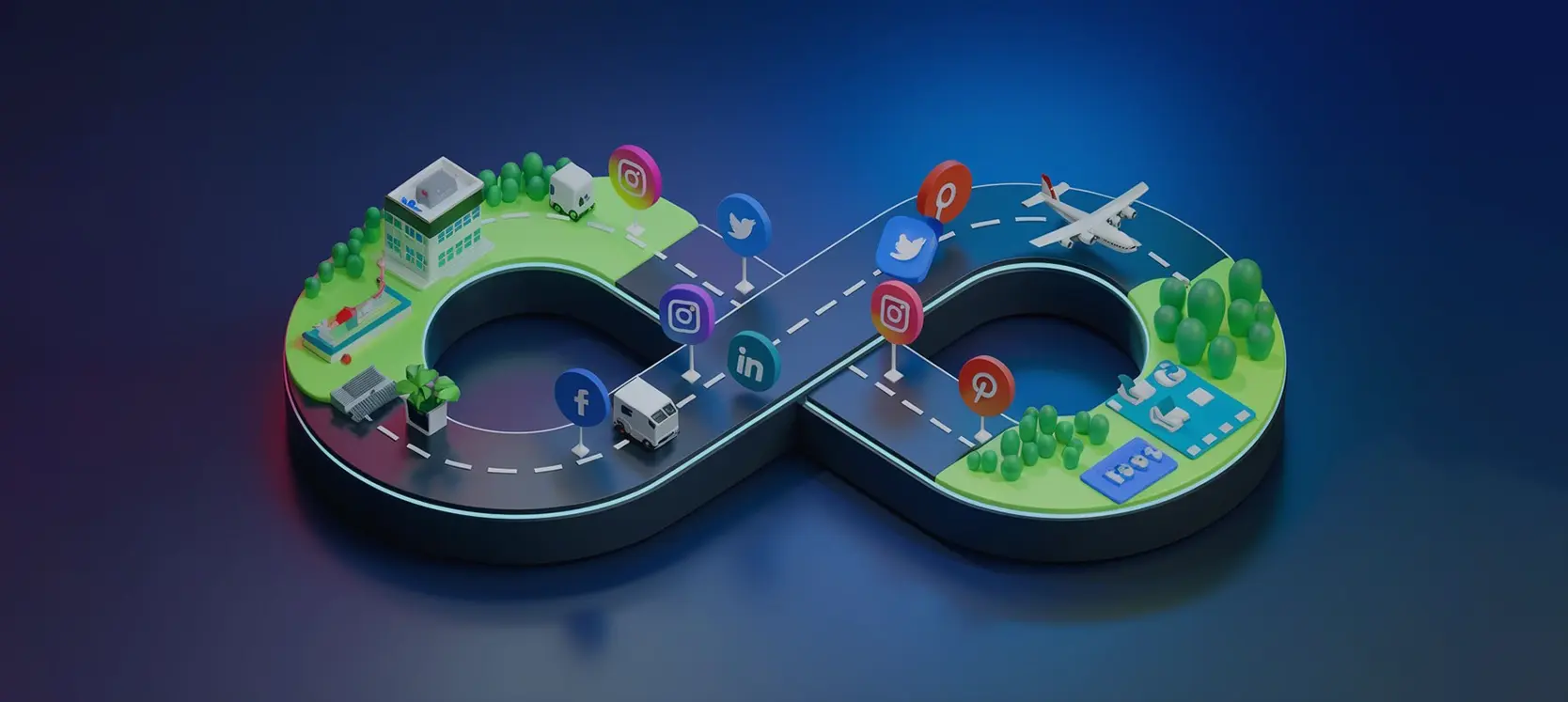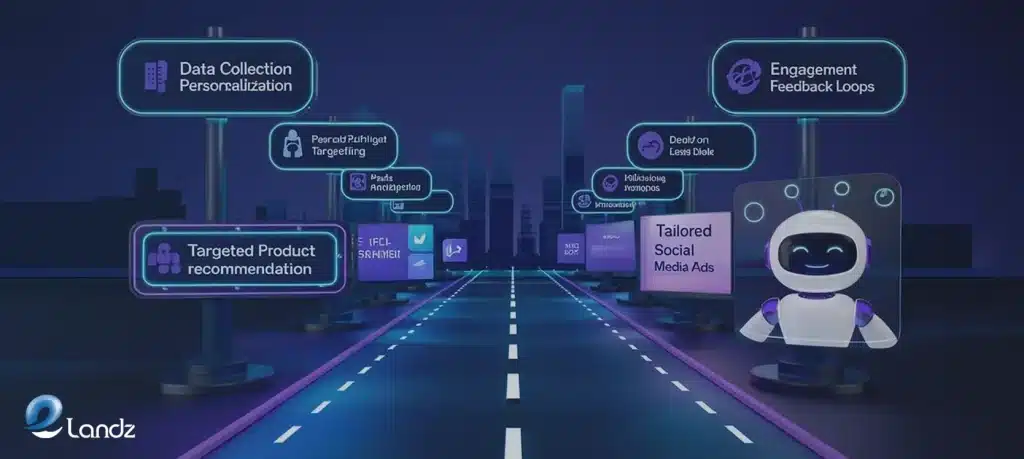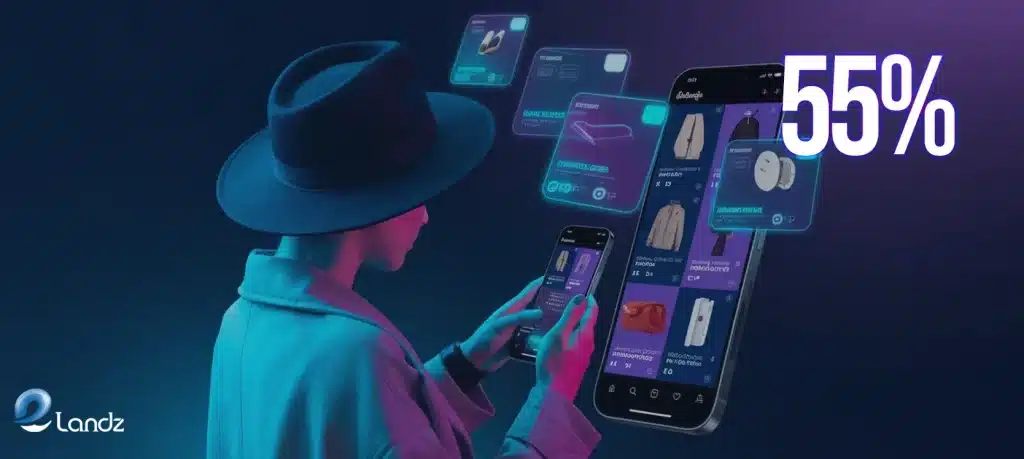
25 Nov The Latest Digital Marketing Trends You Should Know About
Introduction
What are the latest digital marketing trends as we step towards the future? According to Expertmarketresearch, the digital marketing industry will grow at a CAGR of 13.1% between 2024 and 2032, reaching $1099.33 billion.
Just collect your thoughts and answer this question: how is your company using digital marketing optimization to its advantage? This article will cover the latest digital marketing trends that can be a ground-breaking change for your team.
The Rise of AI-Powered Marketing

How can you revolutionize customer engagement? What if I wrote this article using an AI chatbot and you are reading this information about AI-driven chatterbots? Talk about “chatbotception.”
The role of AI in online digital marketing is no less than fascinating. Its impact has been huge! Well, huge is an overstatement. It is redefining the marketing game. The incorporation of machine learning models is powering the personalization process.
Machine Learning Models Driving Personalization
Personalizing marketing campaigns is a serious business. Research confirms that quickly growing companies generate 40% more revenue from personalization than their slower-growing counterparts.
What is powering the personalization process? Machine learning models. From e-commerce customer segmentation to meaningful product recommendations, marketing teams can curate more empathetic CX experiences.
AI-Enabled Chatbots
At its core, a chatbot is a computer program that mimics human conversion. The addition of generative artificial intelligence is the “olive oil for the pasta” in this case.
The examples of these AI-driven virtual agents are all around us. Whether it is rummaging through ChatGPT for answers, or asking your favorite brand’s AI sales chatbot to cater to your queries, the artificial intelligence chatterbot fever is real.
Artificial Intelligence Analytics
AI in analytics involves analyzing large data sets and generating insights. I have already mentioned the point of marketing campaign personalization. However, AI-backed analytics is much more than that.
Sentiment analysis tools can use social media to figure out public opinion and trigger purposeful market research. A Forrester survey further confirms that 53% of marketing leaders either use or are planning to use artificial intelligence for predictive analytics.
Social E-Commerce
According to SmartInsights Digital Marketing Survey, the number of social media users globally grew from 4.72 billion in January 2023 to 5.04 billion in January 2024. Of course, online marketing experts, sales teams, and founders are realizing that social media can make a substantial difference.
This is one of those digital marketing trends that has huge potential for the future. You ask why? The reasons behind this shift in social e-commerce popularity are user-generated content, additional shopping features on social media platforms, and Gen-Z’s technological affiliation.
Customized tools fit neatly into an organization’s workflow thereby wiping out the problem of cutting steps needlessly and automating repetitive duties. A decrease in processing time, reduction of errors, and efficient resource allocation are the direct benefits!
Below are some tips that can prove to be handy for developing tailored tech solutions for marketing.
Transforming Shopping Experiences

It’s not just me who’s making all these superfluous predictions. Statistics do show that more than half (55%) of Gen Z shoppers have bought items online while browsing social media. These numbers are truly shocking.
Forget the days of overcrowded malls. Instagram, TikTok, and Facebook are bustling marketplaces where consumers can discover and purchase products without leaving the app. Social e-commerce allows brands to engage with consumers more intimately. Marketers are now utilizing social media’s visual dynamism to showcase products in real time, tapping into consumers’ desire for instant gratification.
Hyper-Targeted Campaigns
The rise of social e-commerce also brings a flood of data. Social platforms offer insights into consumer behavior with unimaginable details and so much scope. Marketers can now run hyper-targeted ad campaigns that reach the right audience at the right time.
Honestly, in my opinion, this information also educates marketing strategists and online content writers on what is striking the audience’s attention. Moreover, the voices of social media figures, bloggers, and enthusiasts increase customer engagement even further.
Video Marketing 2.0
Let’s think beyond traditional content. Who doesn’t love watching videos, It is hassle-free, takes less effort, and sometimes high-quality content gets the brain juices flowing. However, it depends on the kind of brand image you are trying to portray.
Consumer preferences are also pivoting towards dynamic content. According to the HubSpot blog, 90% use video marketing as part of their digital marketing strategy. Marketers should familiarize themselves with online video trends to stay ahead!
On-demand Video Streaming
On-demand video streaming has become a cornerstone of modern marketing strategies. Platforms like Netflix, Hulu, and YouTube are changing the meaning of content consumption.
Hence, this is a golden opportunity for marketers to reach appropriate audiences. The goal is to ensure that content is seen and appreciated, thereby enhancing brand visibility and loyalty. Therefore, marketers can reach the right buyer through tailored advertisements and branded content.
Short-Form Videos
Over 726.8 million people use Instagram reels. Let that sink in. It is quite addictive, most websites mention that the optimal time duration for maximum Instagram reel engagement is 6 seconds.
It all makes sense, video-based, short, to-the-point, and something that gains the viewer’s traction. However, generally, short-form videos are 15- 60 seconds long. Now, this can be anything from a product unboxing video, to a hospitality experience or even a skincare routine.
AI Content Creation
For seasoned marketers, the integration of AI into content strategies is not merely an upgrade but a must. This analytical power leads to highly personalized content that speaks directly to individual consumer preferences. In an era where customers look forward to tailored experiences, AI’s capacity always delivers.
You might have noticed how Google search results even feature AI-generated information. This is a sign that the future of content creation will merge the best AI tools with human foresight
AI Content Personalization
As seasoned professionals, you already know the importance of sending the right message to the right audience at the right time. AI can unearth insights humans might miss, allowing for hyper-personalized content that speaks directly to a potential customer.
One of the most compelling benefits of AI personalization is its ability to improve conversion rates. Imagine a potential client visiting your retail and clothing website; AI can analyze their past interactions and serve up riveting content whether it’s a podcast, case study, or product demo.
AI & Human Collaboration
True magic happens when AI and human creativity intersect. While AI provides the foundation of data, human ingenuity adds emotion, storytelling, and strategic depth. Consider a scenario where AI suggests content topics based on trending data, and your team uses this information to create a captivating campaign.
AI can take care of tasks like keyword optimization and content scheduling. Hence, your creative team can develop concepts and explore new ideas. By leveraging the strengths of both AI and human expertise, you can produce high-quality content that captivates, converts, and ultimately, sustains.
Conversational Marketing Trend
I came across this name recently. I had to do some extra digging to understand its meaning and popularity. It is a new dialogue-driven marketing approach that brings in leads through real-time conversation. Bite-sized content will always get the spotlight, and there are studies to back this statement up.
However, the potential is “humongous.” That’s why conversational marketing is on my list of the latest digital marketing trends today. A memorable conversation is the heart of an authentic relationship. It has the strength to convert your day from dreary to dreamy.
On-demand Video Streaming
Conversations can take place on channels that customers prefer. Immediately, they can turn into spaces where brands can initiate relevant dialogue. For example, a voice-activated chatbot for a mobile phone company can churn exact information from the customer.
They can highlight their experience, concerns, and queries – mainly anything. It’s just simpler to converse. Through interactive video ads and live-streamed Q&A sessions, marketers can respond immediately. The result? Brands can gather valuable feedback.
Apps for Short-form Videos
Companies using conversational marketing saw 20% more sales opportunities, 10% more average order value, and 5-10% more customer retention. Apps like TikTok and Instagram offer companies a platform to engage and resonate with today’s fast-paced consumers.
In-app messaging and interactive polls curate a more participatory customer experience. Conversational chatbots can streamline customer service by answering queries and guiding users through the purchase process efficiently.
Privacy-First Marketing
Are you ready for a cookie-less future? Firstly, let’s uncover the basics of privacy-first marketing. This approach demands the incorporation of data protection principles. You’ve probably heard about Google’s decision to remove cookies.
In this case, customers can choose their only privacy preferences. 63% of global consumers believe that most companies are not transparent about their data usage.
Zero-party Data Usage
Amidst evolving digital marketing trends, zero-party data allows businesses to create more targeted campaigns. Imagine directly asking customers for their preferences. It promotes feelings of ease and trust.
Integrating zero-party data into marketing strategies also aligns with SEO best practices. By understanding what content and products resonate most with the purchasing party, marketers can improve search engine rankings, and drive more qualified leads! As data privacy regulations tighten, zero-party data emerges as a compliant, ethical solution.
Contextual Advertising Popularity
The valuation of the contextual advertising market was USD 13.5 billion in 2023 and the estimation for 2024 to 2032 is over 19%. Nowadays, it’s all about the cold hard facts, isn’t it?
This kind of targeted advertising is just more relevant. Let’s face it, the randomest of advertisements on web pages or even mobile apps are a huge annoyance! Contextual advertising campaigns will pave the way for smart selling.
Influencer Marketing Evolution
Believe it or not: micro and nano influencers are now taking centre stage. While skimming through my Instagram feed, the most intriguing content is from influencers with a lower follower count. (in most situations)
It’s just more genuine. Plus, you can expect views to be real in most cases. For example, once I saw a profile of this micro-influencer who deems herself a remote work specialist. There’s a keyword, you have an audience, and viola!
Getting Brand Ambassadors
Authenticity and relatability are the cornerstones of modern consumer engagement. Online brand ambassadors know how to deliver in this arena. Unlike traditional advertising, which often feels impersonal, brand ambassadors bring their voice, couple that with loyal followers you get the ultimate marketing solution.
The partnership of content marketing and social media has been fruitful for most brands. Platforms like TikTok, and YouTube have democratized influence, allowing ambassadors to cultivate dedicated followings. This shift reflects a broader trend in digital marketing where personalized, story-driven content triumphs over conventional ads.
Performance-based Influencer Marketing
The global influencer marketing market value stood at 21.1 billion U.S. dollars as of 2023, having more than tripled since 2019. The results determine the influencer’s compensation.
Unlike traditional ads that mostly scream for attention, these ambassadors blend seamlessly into the digital landscape. They are well aware of local trends, follower preferences, and even the hottest topics. They know what works and what doesn’t. This step underscores a broader movement toward content that prioritizes engagement over interruption.
Online Sustainable Marketing

How do you connect with conscious consumers? It might be surprising but sustainable marketing has become the talk of the town. Today’s customers are more alert, more familiar with social media trends, and therefore more selective.
75% of millennials consider sustainability before purchasing, and 73% of Gen Z respondents are willing to pay more for sustainable products. Ever heard about marketing with a purpose? Well, that’s the essence of sustainability.
Green Digital Marketing
Green marketing is the marketing of products according to their environmental sustainability. This digital marketing trend will never go out of fashion. The world is so obsessed with infrastructure and commercialization, that we sometimes forget about our carbon footprint.
For example, your business has a fast-loading website. What are the advantages from a green digital marketing perspective? It is not only great in terms of search engine optimization guidelines but it consumes less energy. Similarly, online digital ads reduce the cost of extra material.
Campaigns With A Cause
All businesses should invest in green marketing strategies. It is not just a concept, but a lifestyle that can optimize digital marketing activities. According to a recent survey, 65% of consumers want to buy from purpose-driven brands that advocate sustainability.
A purpose means that your brand or services ultimately hold more credibility and reliability. Examples include utilizing email marketing to send letters or news to promote green practices. Another use case I read was how relevant URLs, keywords, and meta descriptions can aid in increasing awareness.
Communicating Social Impact
Begin from your target audience. How can you guide them about digital green marketing? Through the usage of pay-per-click advertisements, you can understand the audience even better.
Of course, packaging also matters. However, social media platforms can assist companies in sharing their message, and sustainability stories and further educating people on the matter. Plus, there are more opportunities for collaborations online.
Conclusion
“Marketing is no longer about the stuff that you make, but about the stories you tell.” –
Seth Godin, author, entrepreneur, teacher
The story behind your product is the heart and soul of your marketing campaign. Seizing the latest digital marketing trends means more than just keeping up; it means setting the pace. Listen up marketers, content writers, and founders. Make that decision now.
You will find yourself better equipped to capture market share and build stronger connections.
FAQS
What are the latest digital marketing trends?
Key trends like AI-driven personalization and online sustainable marketing are revolutionizing customer interactions.
Video marketing continues to attract audiences, offering dynamic storytelling opportunities that resonate deeply. Meanwhile, data analytics provides unprecedented insights.
Will AI take over digital marketing?
AI won’t take over digital marketing; it’ll uplift it.
As transformative tools, AI systems provide unparalleled data-driven insights, automate repetitive tasks, and offer personalized customer experiences, all of which enhance, not replace human efforts.
What is the next big thing in digital marketing?
The next big thing in digital marketing is AI-backed chatbots that will take customer service to the next level.
Enterprises have been using chatbots for quite some time now, and marketing is capitalizing on the trend.
Which type of digital marketing is best for the future?
Digital marketing will hinge on AI-driven personalization, robust content marketing, and insightful data analytics.
AI will tailor customer experiences, enabling businesses to engage more effectively by conveying the right message to the right audience. Content marketing will continue to thrive in the digital realm.
Is there a bright future in digital marketing?
The future of digital marketing is undeniably bright.
As technologies like AI, data analytics, and immersive experiences continue to advance, they drive a new wave of marketing strategies that meet the growing demand for personalized customer interactions.


